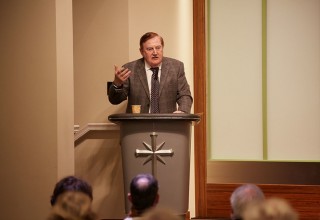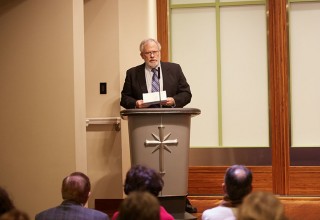CCHR Sacramento Remembers Victims of the Holocaust

SACRAMENTO, Calif., February 3, 2019 (Newswire.com) - At a program hosted by the Church of Scientology Sacramento January 27, International Holocaust Remembrance Day, Citizens Commission on Human Rights (CCHR) Sacramento honored victims and survivors of the Holocaust and discussed violations of the Nuremberg Code in today’s world. CCHR, a nonprofit mental health watchdog, is dedicated to ensuring the rights of mental patients and ending psychiatric abuse.
The UN General Assembly designated January 27—the anniversary of the liberation of Auschwitz—as International Holocaust Remembrance Day, to remember the victims of the Nazi era and encourage the development of educational programs to prevent future genocides.
Keynote speaker Sy Karfiol, a Holocaust survivor who now lives in Roseville, California, provided a deeply moving example of why we should never forget the Holocaust.
In September 1942, when Karfiol was 2, his father was taken from his business in Brussels and transported to Auschwitz. A priest helped his mother find a Catholic family who agreed to raise him and his 11-year-old sister as their own children. Then she and Karfiol’s grandmother disappeared. They worked for the resistance until they were caught and killed. Karfiol’s father, one of the few who survived Auschwitz, made his way back to Belgium in 1946, where he was reunited with his children.
Although Auschwitz was liberated 74 years ago, in his presentation at the conference, the president of CCHR Sacramento urged those attending not to be complacent and “to look at what caused the Holocaust in order to prevent genocides from happening today or in the future.”
He explained that although it is not broadly promoted, German psychiatrists operated six euthanasia centers where it is estimated between 220,000 and 269,500 individuals with schizophrenia were sterilized or killed. These facilities provided the training, personnel, technologies and staff to create the mass extermination camps of the Holocaust which resulted in the killing of millions of Jews and other people Nazi psychiatrists deemed unworthy of life.
According to Psychiatry's role in the Holocaust, a paper published by the National Center for Biotechnology Information, part of the United States National Library of Medicine, a branch of the National Institutes of Health: “Medical observers from the United States and Germany at the Nuremberg trials concluded that the Holocaust might never have taken place without psychiatry.”
In 2010, Dr. Frank Schneider, president of the German Association for Psychiatry and Psychotherapy addressed a convention of psychiatrists about psychiatry’s role in The Third Reich. He said, “Our shame and regret are also rooted in the fact that it has taken this association, of which I am President today, 70 years to make a systematic effort to come to terms with its past and the history of its predecessors under National Socialism, and—irrespective of the historical facts that may come to light—to ask for forgiveness from the victims of forced migration, forced sterilization, human experiments and murder.”
The Nuremberg trials brought many Nazi war criminals to justice and resulted in publication of the Nuremberg Code, which delineates what is legal and illegal when conducting human experiments, and it includes the need for informed consent.
“Although the Nuremberg Code is vitally important, it does not eliminate the need to be vigilant and take action. One of the most glaring examples of this today is that each of the 50 states has laws legalizing involuntary psychiatric commitment,” said the CCHR president.
California law, referred to as 5150 because of its number in the Welfare and Institutions Code, gives psychiatrists and other mental health professionals authority to work with law enforcement officials to take any man, woman or child, regardless of age, into custody and transport them to a mental health facility against their will if they believe the person is mentally ill. The state grants them this power even though psychiatrists themselves question the science their profession uses to classify mental illness.
In the words of one psychiatrist, a resident physician in psychiatry at the Stanford University School of Medicine, “…the purview of psychiatry has largely remained limited to diseases that defy explanation. Our specialty has been relegated to the medicine of the unknown. We can’t yet test your blood for schizophrenia. We’re unable to diagnose bipolar disorder on imaging. We’re left with the Diagnostic and Statistical Manual of Mental Disorders and its inherently subjective criteria for defining illness.”
The disorders he refers to are merely voted into existence by psychiatrists and added to the Diagnostic and Statistical Manual of Mental Disorders (DSM) according to psychotherapist Gary Greenberg in an interview in The Atlantic.
In light of these admissions and the many cases of abuse CCHR has documented, the program concluded with an appeal for vigilance and strict adherence to the Nuremberg Code and other human rights safeguards and for private citizens to report to CCHR abuse of the rights of those in the mental health system.
Citizens Commission on Human Rights was co-founded in 1969 by professor of psychiatry Dr. Thomas Szaz and the Church of Scientology. With headquarters in Los Angeles, California, CCHR International guides a global human rights advocacy network of some 180 chapters across 34 nations. CCHR Commissioners include physicians, psychiatrists, psychologists, lawyers, legislators, government officials, educators and civil rights representatives.
For a full exposé of the role of German psychiatrists in the Holocaust, watch The Age of Fear on the Scientology Network.
Source: ScientologyNews.org




